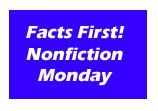True story: as a kid, I hated writing. It was easily one of my least favorite things to do, until a wonderful sixth grade teacher had writing days once a week, and eventually wore me down to the point that in high school I constantly had a notebook with me and spent every spare moment (and even some class time that technically wasn't "spare") writing (Animorphs fan fiction, if you're curious).
So if Spilling Ink had been around back in middle school, I probably would have devoured it.
Mazer and Potter have broken down writing into three general sections - Ready, Set, Go!; Crafting Your Story; and The Writer's Brain - and then those sections have been further divided into smaller sections, each like a mini-article written by Mazer or Potter (complete with byline, so you know who's talking to you). Some old writing standbys are addressed, like where to get ideas and questions to answer to help build your characters, but some other sections are unique to a book for young writers, like a few guidelines on writing children's picture books, and how to accept criticisms and tell good criticism from bad. About the only aspect of writing that isn't covered here that is covered in "adult" writing guides is publication.
Like noted in the Fuse #8 review, after children's books and series writing were mentioned, I hoped that other genres would be covered, like graphic novels and nonfiction, but I think the picture books and series were noted simply because those are the author's strengths. It's not a bad thing, but definitely left me wanting more!
I also have to say, this isn't a book that lends itself well to skipping from section to section - it seems designed to be read cover to cover. The small sections have really creative names, but that creativity sometimes means you can't figure out what they're about without the context of knowing its place in the entire book. "How to Turn Off Your Brain and Turn On Your Ideas" is straight forward, but "The View from the Boulder" is less so. So while in the introduction Mazer and Potter say they want this book to be for kids who are writers, kids who want to be writers, and kids who have no idea they want to write, I'm betting that last group isn't going to be picking this one up on their own. For kids who are passionate or curious about writing, this will be helpful, and really that's enough for me!

Today's Nonfiction Monday is hosted by Apples with Many Seeds! Be sure to stop by and check out the other great nonfiction being posted today!